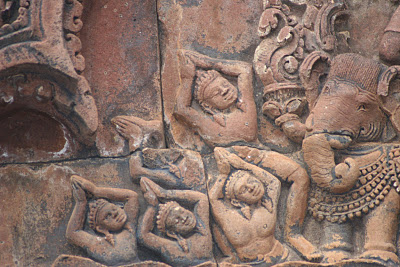
We have visited the question of the difference between inner and outer impressions on a number of occasions recently.
Paul addresses what may be the same question in chapters 1 and 2 of his letter to the Romans.
It
is all too easy to interpret Romans 1: 24-32 as a condemnation of
homosexuality and other aberrant sexual practices. However, I believe
Paul takes considerable pains to explain that in these two chapters, he
is speaking about the difference between inner practice -- the receiving
of impressions through the six inner flowers, impressions "sent from
God" -- and outer practice -- that is, receipt of impressions through
the five ordinary senses.
He specifically cites the incorrectness of mixing an understanding gained through inner impressions with outer impressions:
"21.
Because of that, when they knew God, they glorified him not as God,
neither were thankful; but became vain in their imagination, and their
foolish heart was darkened.
22. Professing themselves to be wise, they became fools,
23.
And changed the glory of the uncorruptible God into an image made like
to corruptible man, and to birds, and four-footed beasts, and creeping
things." (King James version, Romans 1: 21-23)
On the surface,
this appears to be about the practice of idolatry, but given the
standard early Christian practice of depicting fish, birds, lions,
lambs, and so on as symbols of Christ--which was never condemned--, I
feel it is unlikely that Paul is referring to the using of such imagery
per se.
Instead, he appears to be discussing man's habit of turning inner
experience against itself, literalizing it, and making it an object of
the five outer senses. In this sense he is arguing against what the
Buddhists call attachments.
Paul was probably well aware of the
danger of misinterpretation of his allegory, because in the very next
chapter, the first verse warns people
not to use his words as an excuse for judging other people's habits.
"1.
Therefore thou art inexcusable, O man, whosoever thou art that judgest:
for wherein thou judgest another, thou condemnest thyself; for thou
that judgest doest the same things." (KJV, Romans 2:1)
Paul
finally wraps up the discussion about judgment, law, Jews, Gentiles, and
circumcision at the end of chapter 2 by making it quite clear that the
circumcision he speaks of has nothing to do with the standard outward
Jewish practice of
physical circumcision:
"28. For he is not a Jew, which is one outwardly; neither is that circumcision, which is outward in the flesh:
29.
But he is a Jew, which is one inwardly; and circumcision is that of the
heart, in the spirit, and not in the letter; whose praise is not of
men, but of God." (KJV, Romans 2: 28-29)
We are perhaps reminded
here of Solomon's wrap up at the end of Ecclesiastes--all of which is
critical analysis and condemnation of our intense attachment to
outwardness--in which he says:
"Let us hear the conclusion of the
whole matter: fear God, and keep his commandments: for this is the
whole duty of man." (KJV, Ecclesiastes, 12:13)
Reviewing all this left me with the question of exactly what circumcision "of the heart and in the spirit" means.
As
it happens, being engaged in the audio editing of Beelzebub, I am
working on the chapter "Beelzebub in America," and there is a passage
discussing the practice of circumcision in some detail. Since the
subject itself does not come up that much in esoteric literature, it
must have some specific significance we have not considered in enough
detail.
One of the most obvious possibilities here is that we are
looking at an analogy which teaches us that we must shed the outer in
order to stand naked before God in our most intimate parts. I think we
can all agree that makes a great deal of sense. If this is correct, the
choice of circumcision as a symbol contains some magnificent
understandings that relate, surprisingly enough, to the enneagram, which
is not a place one would usually look when discussing circumcision.
The act of circumcision involves encirclement; in an act of
encircling,
moving in a circular motion, one cuts the foreskin, thereby separating
the outer from the inner. The outer is discarded, leaving only the
essential part: the reproductive organ. And it is this reproductive
organ itself that stands naked before God. We see therefore that the
idea of circumcision mirrors the idea of completing the enneagram,
sealing the inner vessel.
We may suppose that circumcision "of
the heart" may well have something to do with eliminating all that is
emotionally unnecessary except the worship of God itself--which is
precisely what Solomon advocates in the last lines of Ecclesiastes--,
and laying the heart bare to accept the "reproductive power of God,"
that is, the implicit power of Godhood made flesh through the Holy
Spirit, which is what Christ called everyone to. We see here an
inference that there must be an emotional cleansing within.
Circumcision
"in the spirit" refers to a location. I believe that taken in the
whole, the phrase "of the heart and in the spirit" comes very close to
referring to a specific kind of yoga work involving a specific location
and a specific part within the being. We need look no further than the
yogic symbol of the
linga, or
male phallus, to know that reproductive parts have been used as an
allegorical reference for spiritual work since ancient times. The fact
provides one more peculiar and provocative link between Paul's letters
and traditional yogic practice.
I know some will argue it isn't
possible that Paul could have been referring to anything like this. Of
course, it is quite possible. Jesus Christ clearly taught of an
esoteric set of principles; as an initiate, Paul had to be familiar with
them. The very fact that he refers to "inner circumcision" implies that
he was speaking in parables, the same way Christ did. And for my own
part I believe it is patently impossible that a man at Paul's- or
Christ's- level could possibly have remained ignorant of yoga, a
long-standing religious school whose practices had to have been known
all over the middle East by the time he was born.
We know that
the enneagram represents two specific sacred laws within the universe.
We also know that circumcision was a sacred law within the Jewish
community. So when Paul refers to "inner circumcision," he definitely
refers to following sacred law according to inner principles. For
myself, the
inner study of the enneagram exemplifies exactly this kind of activity.
When
we take these two chapters together, we also see that any
interpretation of Christianity that insists on literalism in biblical
text can only sustain itself through a willful invocation of ignorance.
When
we consider Gurdjieff's explanation of the practice of circumcision, we
encounter a good deal more interpretive difficulty. I don't have room
to examine possibilities in this post, lest it become overly long, but I
do have the following observations.
Gurdjieff had a habit of
burying his analogies deep within apparently reactionary diatribes
against contemporary morals and sexual practices. Consider, for example,
his insistence that aberrant sexual practices excluded a man from the
possibility of development, as recounted in
"In Search of the Miraculous."
This
stands in such stark contrast to his known association as the teacher
of a group of professed lesbians that we can only conclude the man
followed the adage "do as I do, not as I say." As if that were not
enough, Gurdjieff's own sexual peccadilloes amply demonstrate a flexible
attitude toward sexual morality.
Those who try to argue these
facts away are invoking the same willful ignorance we see from those who
would like to interpret the Bible literally. Of course, there are such
people, and they are welcome to their opinions. I prefer to use my
mind in a more concise manner.
In doing so, when I examine
Gurdjieff's discussion of circumcision and masturbation, I am forced to
conclude that he is burying a very serious teaching about inner work
within what appears to be an obvious outer circumstance. I believe that
he specifically chose controversial subjects and said controversial
things about them in order to provoke people. Using this clever
mechanism, reactionaries and dogmatists are reflexively turned away,
their attitudes themselves effectively depriving them of the opportunity
to penetrate his teachings.
In this sense, in order to
understand Gurdjieff's more outrageous and inflammatory passages--which
are not by any means in short supply--, we have to do what he always
told his pupils to: throw out every association we bring to the matter,
dismiss the obvious, and open ourselves to a new possibility.
In
doing so, we have to use all of our parts -- not only the one that
produces the emotional reaction, which is so easy to have and to obey,
but also the gut instinct of our body and the intelligence of our mind,
which will
both tell us--as any
serious Gurdjieff student already knows--that the man was never as
stupid as he appears to be in passages like this.
His exact
meaning may be difficult to penetrate, but I believe Paul's letter to
the Romans gives us a point of entry to the question.
May your roots find water, and your leaves know sun.
 In this particular post I am just going to speak frankly and directly about my own life today, and exactly how I experience it.
In this particular post I am just going to speak frankly and directly about my own life today, and exactly how I experience it.























